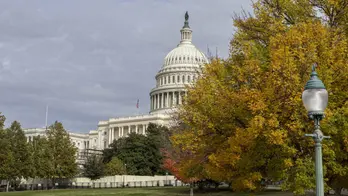On this day in history, January 5, 1933, construction begins on Golden Gate Bridge amid great fanfare
Construction of the Golden Gate Bridge in San Francisco, an American engineering treasure and widely recognized symbol of the grandeur of the United States, began amid civic pride, pomp and circumstance on this day in history, Jan. 5, 1933.
"The start of construction was met with great delight," the Golden Gate Bridge Highway and Transportation District website notes.
"A celebration at nearby Crissy Field went on for hours with at least 100,000 people in attendance. A festive parade through the Marina District began at 12:45 p.m. Navy planes flew in formation and engineering students carried an 80-foot replica of the bridge."
ON THIS DAY IN HISTORY, JANUARY 4, 1965, LBJ TOUTS UTOPIAN ‘GREAT SOCIETY’ IN STATE OF THE UNION ADDRESS
The suspension bridge spans the Golden Gate, the narrow strait of turbulent water that separates the Pacific Ocean from San Francisco Bay. It connects the City of San Francisco in the south with Marin County to the north.
The Golden Gate Bridge boasted the world's longest bridge span (4,200 feet) and tallest bridge towers (746 feet) upon its completion. Its length was surpassed by the Verrazzano-Narrows Bridge in New York City in 1964 and by other bridges since.

UNITED STATES - JANUARY 26: The Golden Gate Bridge, 1933-1937, architect Joseph Baermann Strauss, and the bay of San Francisco, California. (Photo by DeAgostini/Getty Images)
The Golden Gate Bridge opened, remarkably, in May 1937, little more than four years after San Francisco Mayor Angelo Rossi and Golden Gate Bridge and Highway District board president William P. Filmer turned the first pile of dirt with ceremonial golden spades.
President Herbert Hoover sent a telegram of congratulations to celebrate the occasion.
The Golden Gate Bridge symbolized the audacious daring of American spirit even amid global economic calamity.
Built during the Great Depression, the Golden Gate Bridge symbolized the audacious daring of American spirit even amid global economic calamity.
Cincinnati native, part-time poet and bridge enthusiast Joseph Baermann Strauss was the chief engineer of the colossal project.
MEET THE AMERICAN WHO INVENTED THE HARD HAT, A PROUD SYMBOL OF OUR NATION'S WORKING CLASS
He was a diminutive powerhouse of a man, slightly built and standing just 5 feet 3 inches tall. Still, he tried out for the University of Cincinnati football team, where he was injured badly, while being voted class president and class poet by his college classmates.
"Strauss was a prolific engineer, constructing some 400 drawbridges across the U.S. He dreamed of building 'the biggest thing of its kind that a man could build," PBS American Experience writes.

Picture dated Oct. 1935 of the Golden Gate Bridge, in the San Francisco Bay, during construction. The construction began on Jan. 5, 1933, and the bridge was inaugurated on May 27, 1937, by Franklin Delano Roosevelt, who pushed a button in Washington, D.C., signaling the official start of vehicle traffic over the bridge. The idea of engineer Joseph Strauss, it was the largest suspension bridge in the world. (AFP via Getty Images)
"In 1919, San Francisco's city engineer, Michael O'Shaughnessy, approached Strauss about bridging the Golden Gate. Strauss caught fire with the idea, campaigning tirelessly over the next decade to build the bridge."
PBS adds, "In November 1930, a year into the Great Depression, voters at last supported a bond issue for Strauss' bridge. The ambitious project finally had its green light."
His plans included an innovative life-saving measure: a safety net suspended under the floor of the bridge.
"The net proved an invaluable precaution as it saved the lives of 19 men," notes History.com. "These men became known as members of the ‘Half-Way-to-Hell Club.' Despite such safety measures, 11 men died during the bridge's construction."
ON THIS DAY IN HISTORY, DECEMBER 5, 1848, PRESIDENT POLK IGNITES CALIFORNIA GOLD RUSH WITH ADDRESS TO CONGRESS
The Golden Gate Bridge is just one of several of America's most incredible feats of art, architecture and engineering built during the Great Depression.
It's joined on that list by the Empire State Building, Hoover Dam and Mount Rushmore, among other structures that help define the American landscape today.

An aerial view of the Golden Gate Bridge is seen with fog in San Francisco, California, on October 29, 2021. (Photo by Tayfun Coskun/Anadolu Agency via Getty Images)
The Golden Gate Bridge combines, perhaps better than any other bridge in the world, stunning architectural beauty with critical transportation necessity.
It's stunning golden-orange color is officially known as International Orange. It reflects the dual meanings of the color gold in The Golden State.
The strait now known as the Golden Gate earned its name from explorer and U.S. Army officer John C. Fremont in 1846, who considered the passage "a golden gate to trade with the Orient."
Just two years later, gold was discovered in Sutter's Mill, near Sacramento, about 140 miles northeast of the Golden Gate. The precious metal find inspired the California Gold Rush and fueled San Francisco's rise as a major American city.

Monument to Joseph Baermann Strauss (Cincinnati, 1870-Los Angeles, 1938), chief engineer of the Golden Gate Bridge, with the bridge in the background, San Francisco, California. (DeAgostini/Getty Images)
The non-native population of California grew from about 1,000 to 100,000 in 1849 alone.
The San Francisco Bay Area today boasts a population of nearly 8 million people, making it one of the five largest metropolitan areas in the United States.
The metro area includes Oakland to the east of the bay and San Jose to the south of the bay.
CLICK HERE TO SIGN UP FOR OUR LIFESTYLE NEWSLETTER
The Golden Gate Bridge forms a critical transportation viaduct for the region. The bridge is a segment of both U.S. Highway 101, the longest remaining pre-Interstate U.S. route in the nation, and California Route 1, known popularly as the Pacific Coast Highway.
The bridge itself is a major American tourist attraction, drawing about 10 million visitors annually.
Strauss died on May 16, 1938 — just 11 days shy of the one-year anniversary of the bridge's opening to the public.
CLICK HERE TO GET THE FOX NEWS APP
He wrote a poem in tribute to the bridge, "The Mighty Task is Done," soon after its completion.
"On its broad decks in rightful pride/The world in swift parade shall ride/Throughout all time to be/Beneath, fleet ships from every port/vast landlocked bay, historic fort/And dwarfing all — the sea."
For more Lifestyle articles, visit www.foxnews.com/lifestyle.
Disclaimer: The copyright of this article belongs to the original author. Reposting this article is solely for the purpose of information dissemination and does not constitute any investment advice. If there is any infringement, please contact us immediately. We will make corrections or deletions as necessary. Thank you.







